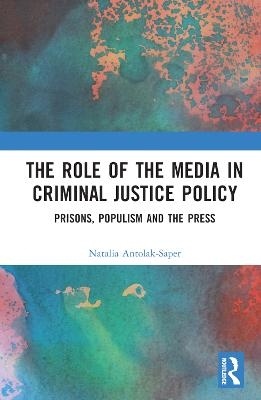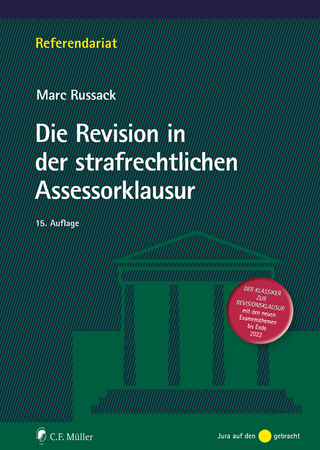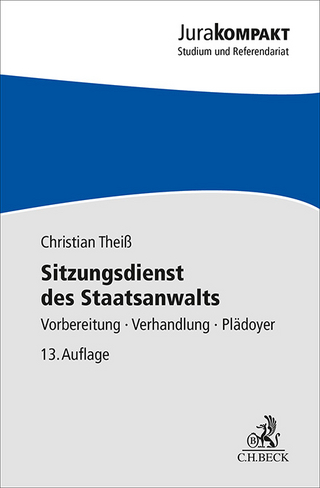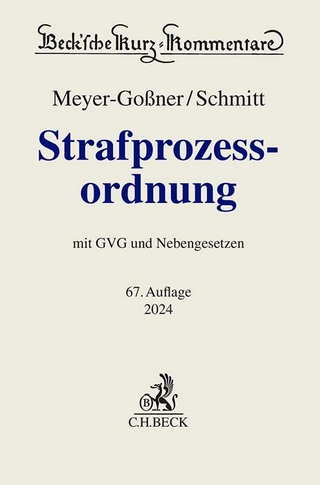
The Role of the Media in Criminal Justice Policy
Routledge (Verlag)
978-1-032-11525-2 (ISBN)
This impact is often assumed. And, especially in the wake of high-profile crimes, the press is routinely observed calling for sentences to be harsher, and for governments to be tougher on crime. But how do we know that there is a connection? To answer this question, the book draws on a case study of the media reporting of the rape and murder of Jill Meagher in Melbourne, Australia; as well as other well-known cases, including those of James Bulger, Sarah Payne, Stephen Lawrence and Michael Brown, among others. Deploying a socio-legal framework to examine how the media’s often powerful and emotive narratives play a crucial role in the development and implementation of law, the book provides a deep and critical reflection on its influence. The book concludes with a number of suggestions for media reform: both to moderate the media’s influence, and to incorporate a broader range of viewpoints.
This multi-disciplinary book will appeal to scholars and students in sociolegal studies, criminology and criminal law as well as those working in relevant areas in sociology and media studies.
Dr Natalia Antolak-Saper is a Senior Lecturer in the Faculty of Law at Monash University, Melbourne, Australia.
List of illustration
Acknowledgements
1 Introduction
I Introduction
II The Approach Adopted
A Theoretical Framework
B Case Study
1 Data Collection for the Case Study
2 Method of Analysis
C Interviews
III Terminology
IV The Structure of the Book
2 Penal Populism
I Introduction
II What Is Penal Populism?
III Conditions Contributing to the Rise of Penal Populism
A Public Opinion
B Media
C Emotion
IV The Effect of Penal Populism on Sentencing Laws and Practice
V Conclusion
3 Media as Agenda Setter
I Introduction
II The Role of the Media in Policy
III Media as Agenda Setter
A Campaigning
1 Media as Advocate
2 Media and Stakeholders
B Framing
1 Faulty System
2 Social Breakdown
3 Blocked Opportunities
4 Media Violence and Racist System
C Fear of Crime and Moral Panics
1 Concern
2 Hostility
3 Consensus
4 Disproportion
5 Volatility
IV Conclusion
4 Media as a Reflection of Public Opinion
I Introduction
II Crime as News Content
III ‘News Values’
A Immediacy
B Dramatisation
C Personalisation
D Simplification
E Titillation
F Conventionalism
G Structured Access
H Novelty
I Risk
J Sex
K Proximity
L Violence
M Spectacle and Graphic Imagery
N Children
IV Conclusion
5 Parole
I Introduction
II Parole and Sentencing in Victoria
A Truth in Sentencing
III The History of Parole Reforms
A Parole in Victoria: 1901–2011
B Historical Media Interest in Parole
C Parole Reforms: Balancing Prisoner Interests with Safety to the Community
IV Changes to Parole From 2011 to 2013
A R v Bayley
V Parole: 2013 to Current Day
VI Conclusion
6 Case Study: Adrian Bayley, the Media and the Reform of Parole Law and Practice
I Introduction
II Media as Agenda Setter
A Campaigns and the Media as Advocate
(a) Media as Advocate
(b) Media and Stakeholders
B Framing
C Fear of Crime and Moral Panics
(a) Concern
(b) Hostility and Consensus
(c) Disproportion
(d) Volatility
(e) Conclusion
III Media as a Source of Information
A ‘News Values’
(a) Immediacy
(b) Dramatisation
(c) Personalisation
(d) Simplification
(e) Structured Access
(f) Proximity
(g) Violence, Spectacle and Graphic Imagery
(h) Conclusion
IV Conclusion
7 Conclusion
I Introduction
II The Media’s Influence on Sentencing and Parole Policies
III Parole Reforms Post-Adrian Bayley in Practice
IV Moderating the Media’s Influence on Sentencing and Parole Policies
A Addressing Misinformation
(a) Informed Public Opinion
B Institutionalising Public Opinion
(a) Introduction
(b) Public Opinion and Sentencing Reform
V Where to from Here? Areas for Further Research
VI Conclusion
Appendix 1: Newspaper Coding Sheet
Appendix 2: Parliamentary Debates Coding Sheet
Appendix 3: Interview Questions
I Senior Politicians
For those not directly involved in the Adrian Bayley Case
For those directly involved in the Adrian Bayley Case
II Senior Policymakers
For those not directly involved in the Adrian Bayley Case
For those directly involved in the Adrian Bayley Case
III Journalists
For Herald Sun journalists specifically
For The Age journalists specifically
Appendix 4: Human Ethics Certificate of Approval
Human Ethics Certificate of Approval
Bibliography
Index
| Erscheinungsdatum | 26.08.2022 |
|---|---|
| Zusatzinfo | 8 Tables, black and white; 4 Line drawings, black and white; 4 Illustrations, black and white |
| Verlagsort | London |
| Sprache | englisch |
| Maße | 156 x 234 mm |
| Gewicht | 453 g |
| Themenwelt | Recht / Steuern ► Allgemeines / Lexika |
| Recht / Steuern ► EU / Internationales Recht | |
| Recht / Steuern ► Strafrecht ► Strafverfahrensrecht | |
| Sozialwissenschaften ► Kommunikation / Medien ► Medienwissenschaft | |
| ISBN-10 | 1-032-11525-4 / 1032115254 |
| ISBN-13 | 978-1-032-11525-2 / 9781032115252 |
| Zustand | Neuware |
| Informationen gemäß Produktsicherheitsverordnung (GPSR) | |
| Haben Sie eine Frage zum Produkt? |
aus dem Bereich


